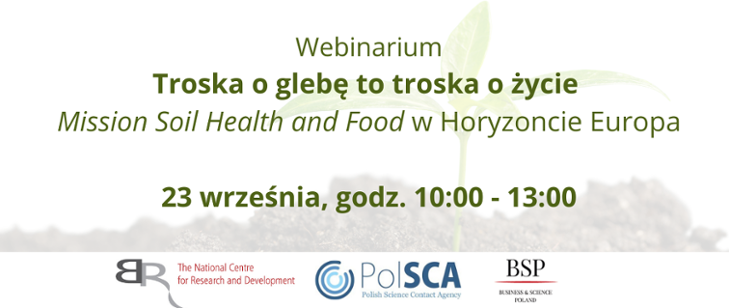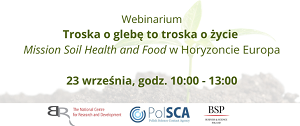On Thursday, September 23, 2021, another discussion meeting on European Missions in the Horizon Europe framework program took place as part of a joint initiative of the PolSCA PAN Office in Brussels and the Business Science Poland, the representative office of the National Center for Research and Development in Brussels. This time the meeting focused on the Mission Soil Health and Food.
The very special guest of the event was the representative of the European Commission (EC), Mission Manager, Nathalie Sauze-Vandevyver, who presented the main aims and priorities of the Mission “Caring for soils is caring for life”. Based on the Report prepared by the Mission Council, Ms. Sauze-Vandevyver presented 8 main objectives of the Mission, as well as proposed particular actions and tools that will help in the achieving these goals. She also explained the relationships and synergies between the Mission and the key EU strategies, such as the European Green Deal or the 2030 European Biodiversity Strategy. At the same time, she informed participants about upcoming publishing of the Communication on European Missions (update: the Communication was published in the late September 2021), on the basis of which the detailed plans for the implementation of each mission – so called Mission Implementation Plans – will be made available soon. In addition to that, the European Commission announced an update of the Work Program 2021 – 2022 regarding the Missions (at the end of the year), and thus also launching of a number of calls in the thematic areas of the missions.
The next two panel sessions were moderated by a member of the Mission Council, prof. Marta Pogrzeba from the Institute for Ecology of Industrial Areas in Katowice. As an introduction to both panel sessions she shortly presented several selected objectives of the Mission “Caring for soils is caring for life”, which set the direction of the discussions. Experts representing the fields of science, business, administration and civil society were invited as debaters in both of the panel sessions.
The first session focused on reducing degradation and increasing soil reuse in cities and urban areas. Among the speakers we hosted: prof. Przemysław Charzyński from the Nicolaus Copernicus University in Toruń, Mr. Mieczysław Wołosz, Director of the Department of Urban Greenery in Katowice and architect dr. Justyna Rubaszek representing the Lower Silesia Department of the Polish Landscape Architects Association. During the discussion, issues related to soil sealing, urban development planning and the search for new solutions in the field of housing construction were raised. The example of Katowice shows a number of difficulties, but also initiatives and actions that have been taken in many Polish cities to protect and revitalize soils. Attention was drawn to the urgent need of activating and raising the awareness of city dwellers, starting with the youngest ones.
The second panel session concerned agricultural land, in particular organic farming. The following speakers took part in the discussion: prof. Magdalena Frąc affiliated at the Institute of Agrophysics of the Polish Academy of Sciences (PAS) and the Agronomic Science Committee of the PAS, Mr Stanisław Jamrozik from BIO-FOOD ROZTOCZE Sp. z o.o., and Ms. Sonia Priwieziencew, President of the Agricultural Biodiversity Foundation „AgriNatura”. The invited guests talked mainly about methods of reducing the risk of eutrophication and pesticide pollution, protection of soil biodiversity and methods of its proper nourishment. The issues of legal solutions and subsidies to organic farming were also discussed.

At the end of the webinar, the meeting participants had the opportunity to hear the speech of Ms. Magdalena Maciejewska, Director of the Department of Strategy and Development at the Ministry of Agriculture and Rural Development. Ms. Maciejewska showed examples of numerous initiatives undertaken at the national (governmental) level in terms of various components of the Mission. She highlighted activities related to soil monitoring, and to the network of demonstration farms being now developed in Poland. Finally, all attendees were invited to participate in the upcoming Horizon Europe calls for research proposals in the field of soil protection.
The webinar gathered over 150 people representing not only academia, but also business, municipalities and various types of non-profit organizations. The lively chat discussion that accompanied all sessions shows how important it is for society to have a healthy soil that produces healthy food. It is certainly a vital component of the environment, which should be at the centre of the European society’s attention.
The comments of the participants stand in for the summary:
- I have two children and I want to leave them clean air, clean water and clean soil. Thus, I am here, asking experts for help. Thank you for today’s meeting!
- Think globally – act locally. Get started today!



